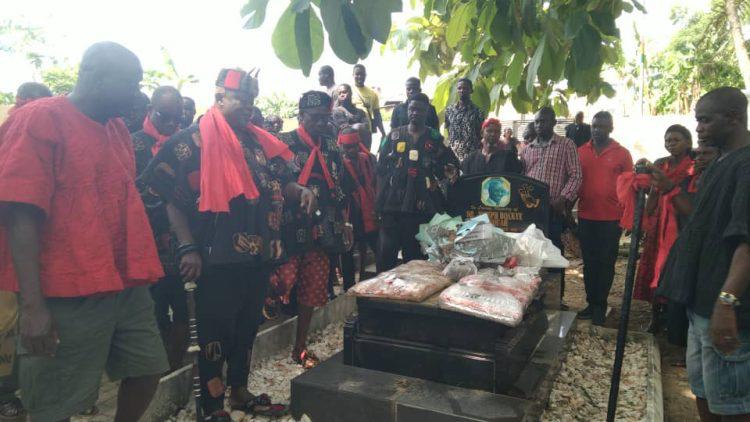The Akyem Abuakwa Traditional Council will storm Parliament today to present a petition to the Speaker of Parliament, Alban Bagbin.
This petition addresses derogatory comments made against the late Dr. J.B. Danquah by Murtala Mohammed, the NDC MP for Tamale Central, during a parliamentary session in February. Mohammed referred to Dr. Danquah, a member of Ghana’s Big Six, as a CIA undercover agent and a traitor who betrayed his country.
This incident coincided with another derogatory comment made by an unidentified NPP MP, who referred to Dr Zanetor Agyeman-Rawlings, the MP for Klottey Korle, as the “daughter of a murderer.” The traditional council is requesting that the offensive remarks against Dr Danquah be withdrawn.
Libation
In preparation for the submission of the petition, some chiefs and relatives of the late Dr Danquah visited his tomb yesterday to pour libation, expressing their disapproval of the comments made by the NDC MP.
Osabarima Okogyeaman Apagya Fori IV, the Apapamuhene and warlord of the Akyem Abuakwa Traditional Area, confirmed that the council would submit its petition to the Speaker. “Somebody has insulted our dear Dr J.B. Danquah. Given all he did for the country, he doesn’t deserve that,” the chief stated.
About Dr. J.B. Danquah
Joseph Kwame Kyeretwie Boakye Danquah, commonly known as J.B. Danquah, was a prominent Ghanaian statesman, lawyer, and scholar who played a significant role in Ghana’s struggle for independence from British colonial rule.
Here are some key points about him:
- Early Life and Education: J.B. Danquah was born on December 18, 1895, in the Gold Coast (now Ghana). He received his education in Ghana and later in the United Kingdom, where he earned a degree in law and a Ph.D. in philosophy.
- Political Career: Danquah was a founding member of the United Gold Coast Convention (UGCC), the first political party in Ghana aimed at achieving independence. He was a key figure in the early political movements that led to Ghana’s independence in 1957.
- Legal and Scholarly Work: In addition to his political activities, Danquah was a respected lawyer and scholar. He wrote extensively on Ghanaian culture, history, and law, significantly contributing to the intellectual foundation of the independence movement.
- Role in Independence: Danquah was instrumental in mobilizing support for independence and was a vocal advocate for self-rule. He worked alongside other prominent leaders, including Kwame Nkrumah, although they later experienced ideological differences.
- Later Years and Legacy: After Ghana gained independence, Danquah remained active in politics but faced persecution under Nkrumah’s regime. He was imprisoned and died in detention on February 4, 1965. Despite this tragic end, Danquah is remembered as a hero of Ghana’s independence and a key figure in the country’s history. His contributions to Ghana’s independence and his intellectual legacy continue to be celebrated both in Ghana and beyond.



